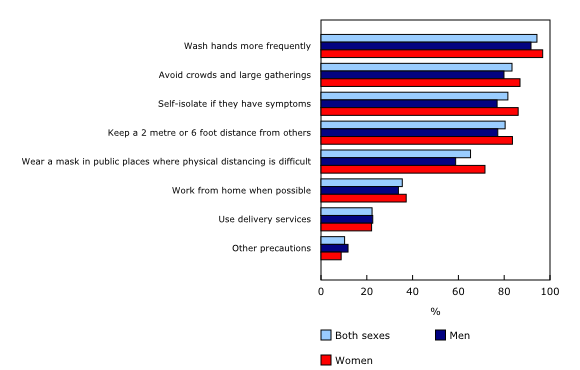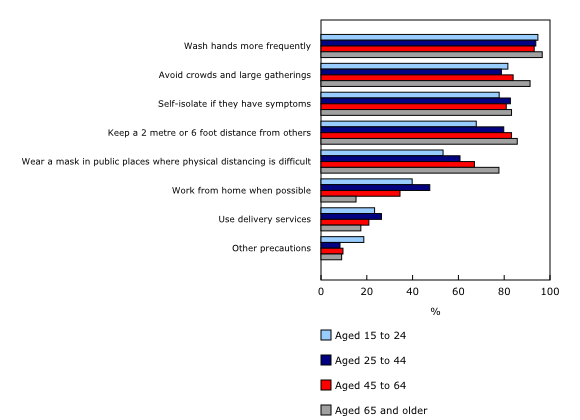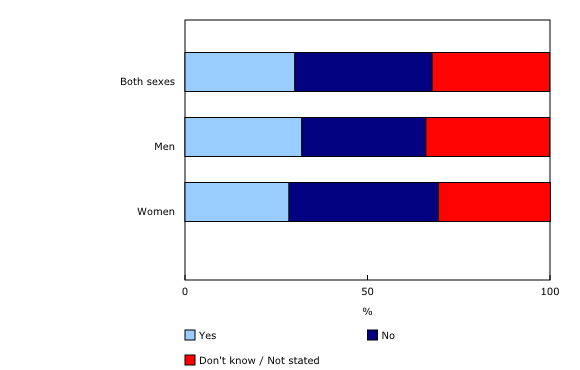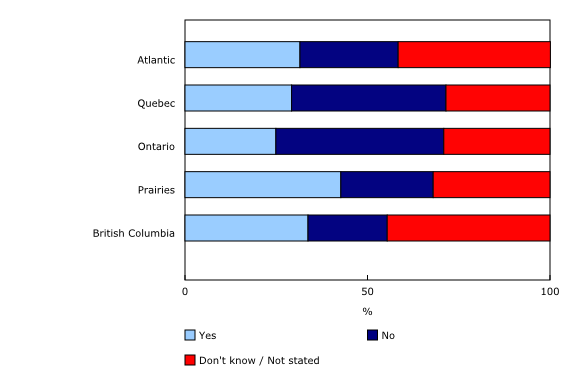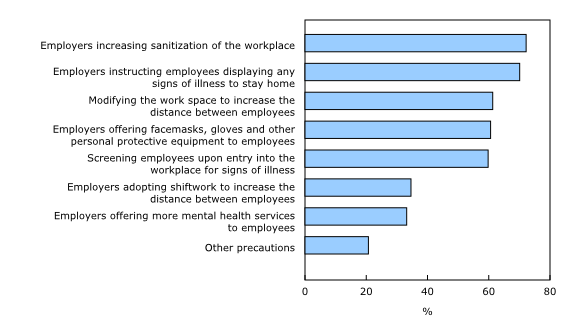Canadian Perspectives Survey Series 3: Resuming economic and social activities during COVID-19
Archived Content
Information identified as archived is provided for reference, research or recordkeeping purposes. It is not subject to the Government of Canada Web Standards and has not been altered or updated since it was archived. Please "contact us" to request a format other than those available.
Released: 2020-07-08
The COVID-19 pandemic has had an enormous impact on the social and economic activities of Canadians. After months of restrictions that included lockdown measures and the relatively new concept of physical distancing, governments have slowly begun to roll out reopening plans that have allowed many Canadians to get back to work.
In Statistics Canada's first web panel survey, conducted from March 29 to April 3, soon after COVID-19 restrictions were implemented, Canadians reported high levels of concern about the health, social and economic consequences of the pandemic. This survey also found that a majority of Canadians were following recommendations to limit the spread of the virus, such as physical distancing measures.
In a second web panel survey, conducted from May 4 to 10, respondents indicated that they were still following basic physical distancing rules and limiting their social interactions. However, the results also pointed to a deterioration in the mental health of some Canadians.
This release uses the results of a third online survey, conducted from June 15 to 21, to examine whether Canadians will continue to adhere to recommended health and safety practices as the economy reopens and restrictions are loosened. It also examines whether Canadians are feeling safe returning to work. For the most part, the same respondents were followed over the three surveys, and all of these surveys are statistically representative of the Canadian population.
The findings show that while most Canadians expect to continue adhering to safety practices and limiting their social interactions, some groups will be less likely to do so than others. The results also show that many Canadians are concerned about going back to work.
Women are more likely than men to report that they will follow rules as safety measures are relaxed
Canadians were asked whether they would continue to follow certain rules and guidelines, including physical distancing rules, as COVID-19 safety measures are relaxed. Results indicate that most Canadians intend to do so. For example, more than 9 in 10 stated that they would continue to wash their hands more frequently, and at least 8 in 10 reported that they would avoid crowds and large gatherings and keep a safe distance from others.
For the first time, the survey also enquired about additional precautions, such as self-isolating if the respondent has symptoms and wearing a mask in public. A large majority of Canadians (82%) said that they would self-isolate if they had symptoms, but a lower proportion (65%) reported that they would wear a mask in public places where physical distancing is difficult. These results, however, could change in the future as several municipalities are introducing new regulations about the wearing of masks in public spaces.
Younger Canadians are less likely to report that they will wear a mask or keep their distance from others
Not all Canadians were equally likely to report that they would follow precautions in the context of activities resuming.
For most precautions listed above, men were generally less likely than women to report that they would follow precautions as COVID-19 measures are relaxed. For example, 59% of men said that they would wear a mask in public places where physical distancing is difficult, compared with 72% of women.
Significant differences were also seen across age groups. Young Canadians aged 15 to 24 were especially less likely than senior Canadians aged 65 and older to report that they would wear a mask in public (53% vs. 78%). They were also less likely to report that they would keep a safe distance from others (68% vs. 86%).
Immigrants are more likely to report that they will take precautions
Immigrants were more likely than Canadian-born people to report that they would be taking precautions as COVID-19 safety measures are relaxed.
Immigrants were particularly more likely than Canadian-born individuals to report that they would wear masks in public places (80% vs. 61%), avoid crowds and large gatherings (93% vs. 81%), and keep their distance from others (89% vs. 78%).
Such results are consistent with a report, "The social and economic concerns of immigrants during the COVID-19 pandemic," published earlier during the pandemic, which indicated that immigrants were significantly more likely than Canadian-born people to be concerned about their own health and the health of household members.
The degree of support for some precautions varies across regions
There are some regional differences in the extent to which people reported that they would take precautions as COVID-19 safety measures are relaxed.
For example, slightly more than half of respondents in the Prairies (54%) and in Quebec (52%) reported that they would wear a mask in public when physical distancing is difficult, compared with approximately 8 in 10 Ontario respondents (78%). Canadians living in rural areas were also less likely to report that they would wear masks in public (53%), compared with those living in urban areas (68%).
Residents of Quebec and the Prairies were also less likely than people in other regions to report that they would keep their distance from others or avoid crowds and large gatherings.
A lower proportion of Quebec residents reported that they would self-isolate if they have symptoms (74%). That percentage was at least 82% in all other regions.
Over 90% of residents in all regions reported that they would continue to wash their hands more often, suggesting that this measure has been widely adopted by most Canadians.
Readers who want more information on the precautions taken by Canadians are invited to consult the infographic titled "Precautions that Canadians will take or continue to take as COVID-19 safety measures are relaxed."
Among Canadians who are not yet back in their regular workplace, close to 4 in 10 do not feel safe returning
Months after COVID-19 began to spread in Canada, a large number of Canadian workers continue to work from home or are simply absent from their physical workplace. The survey asked these people whether they felt safe returning to work.
At the time of survey collection in June, close to 4 in 10 Canadian workers who were not in their regular workplace (38%) reported that they did not feel safe returning to work. The most commonly-reported reasons for not feeling safe were fear of contracting the virus and fear of infecting family members. About 30% said that they felt safe returning to their physical workplace, and another 32% said that they did not know or chose not to answer the question.
Immigrant women were particularly likely to report that they did not feel safe going back to work (59%). Such results could be related to the nature of the work performed by this particular group of workers. For example, a previous report, "The contribution of immigrants and population groups designated as visible minorities to nurse aide, orderly and patient service associate occupations," showed that immigrant women were more likely to be found in certain occupations, such as nurse aides, orderlies and patient service associates.
Perceptions of the safety of returning to work also varied across regions. In Quebec and Ontario, which had the most cases of COVID-19, over 40% of workers reported that they did not feel safe returning to work, compared with approximately one-quarter of workers in other regions. People living in urban areas were also more likely to feel unsafe about returning to work than those living in rural areas (38% vs. 32%).
Many workers want safety measures implemented in the workplace
The survey also asked workers who were not yet back in their physical workplace about the measures they would like to see implemented to feel comfortable returning to their workplace.
The two measures that these workers would most like to see implemented were employers increasing sanitization of the workplace (72%) and employers instructing employees displaying any signs of illness to stay home (70%).
In addition, about 6 in 10 workers reported that they would like to see modifications to the work space to increase the distance between employees; they would like their employer to offer facemasks, gloves and other protective equipment; and they would like employees to be screened upon entry into the workplace for signs of illness.
Note to readers
Data in this release are from Statistics Canada's new Canadian Perspectives Survey Series (CPSS), for which a panel of Canadians has agreed to complete a number of short online surveys. The CPSS is a probabilistic panel based on the Labour Force Survey and is therefore representative of the general population. The CPSS enables Statistics Canada to collect important information from Canadians more efficiently, more rapidly and at a lower cost, compared with traditional survey methods. The first iteration of the CPSS was conducted from March 29 to April 3 and collected information from 4,600 respondents. The second iteration was conducted from May 4 to 10, and the third was conducted from June 15 to 21.
In this release, workers who were asked whether they feel safe returning to the workplace (and who were away from their physical workplace at the time of the survey) include the following categories of workers: those who were usually working at a fixed location outside the home but who, in the reference week, were mostly working from home, absent from work or mostly working outside the home with no fixed location; and those who were usually working outside the home with no fixed location but who, in the reference week, were mostly working from home or absent from work.
Products
The infographic "Precautions that Canadians will take or continue to take as COVID-19 safety measures are relaxed" is now available as part of the series Statistics Canada – Infographics (11-627-M).
Contact information
For more information, or to enquire about the concepts, methods or data quality of this release, contact us (toll-free 1-800-263-1136; 514-283-8300; STATCAN.infostats-infostats.STATCAN@canada.ca) or Media Relations (613-951-4636; STATCAN.mediahotline-ligneinfomedias.STATCAN@canada.ca).
- Date modified:


